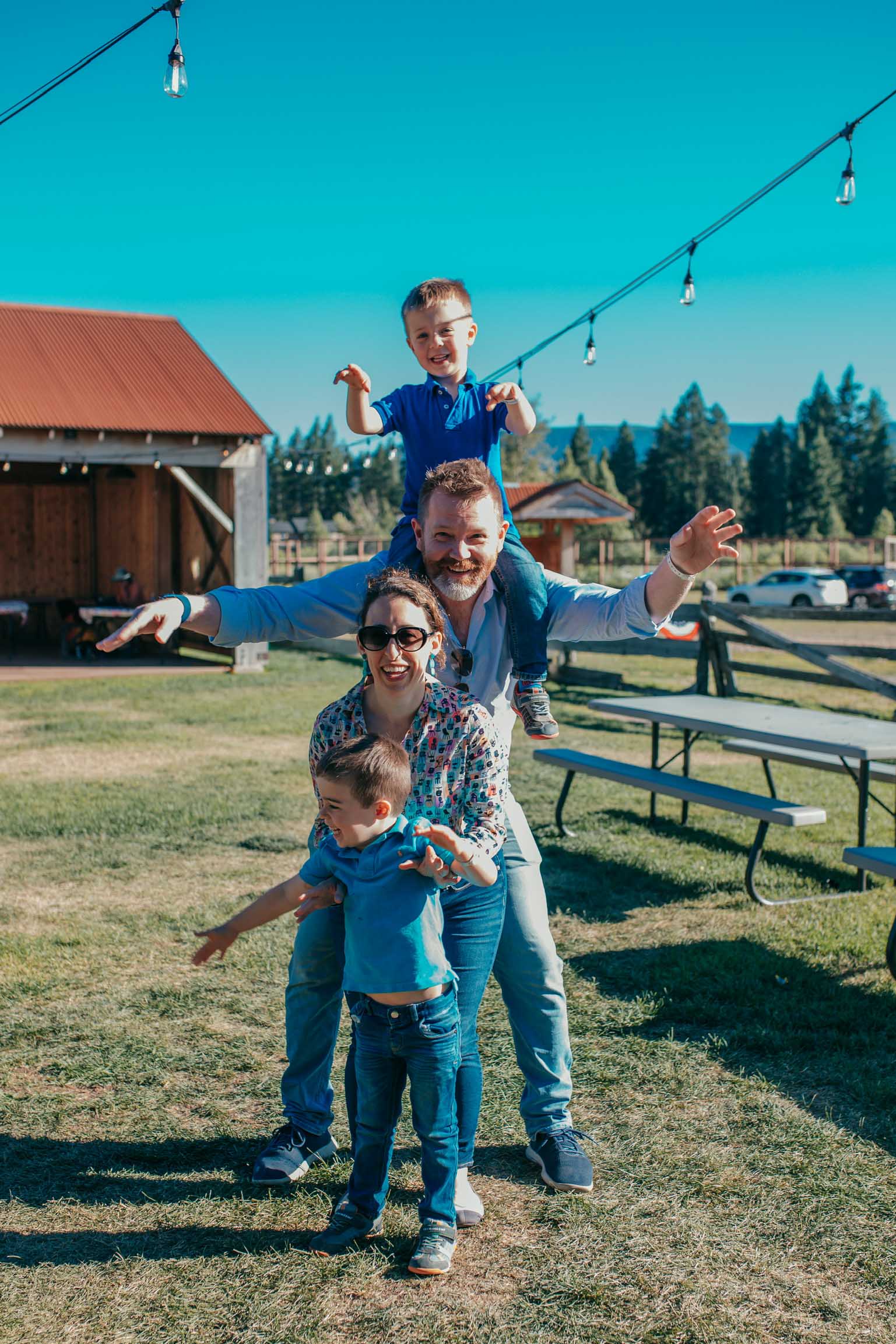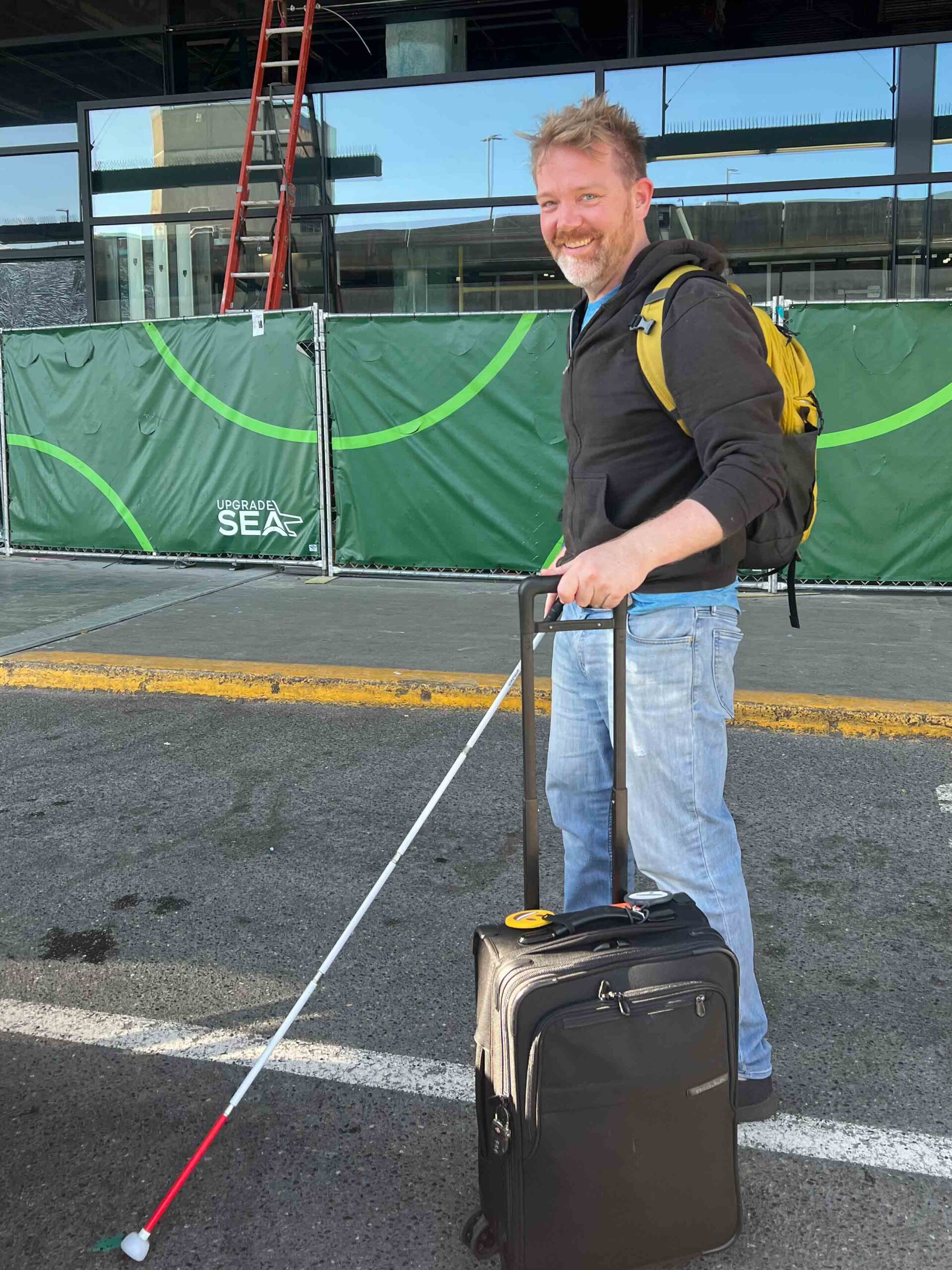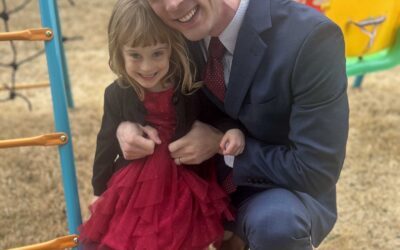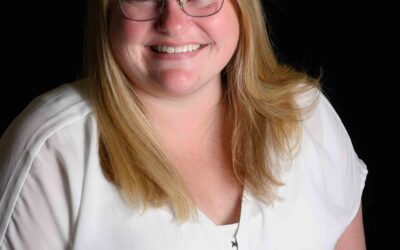blog
Journey of Self-Discovery: Navigating the Mental Challenges of Usher Syndrome
by Michael Conn
March 12, 2024
As I approach my milestone 40th birthday, I find myself reflecting back as one does. With a loving marriage, five year old twin boys, and recently settling into our first home after a decade of fulfilling career and education goals across four cities globally, it’s easy to dismiss any complaints. However, lately, my Usher Syndrome (Type 2A) has taken a more prominent place in my thoughts after my first diagnosis over 10 years ago. To explain more, let’s go back to the beginning.
I was born in Melbourne, Australia in 1984. At the age of three it became evident that I was deaf and after a diagnosis of moderate to server hearing loss, I’ve worn hearing aids for as long as I can remember — I’ve always identified myself as deaf. Thanks to my mother’s foresight, I underwent speech therapy throughout my early years, ensuring that I developed solid speech and communication skills. To this day, many are unaware of my disability due to my complete in canal (CIC) hearing aids and my Australian accent whilst living is the USA helps mask any small lisps.
Beyond deafness, my first memory of vision issues occurred during a hike when I was 15 years old. During the evening’s dusk, I asked my friends to stop so we could put on our headlamps but they wanted to keep going as we were close to the campsite. I stumbled on, tripping on rocks and tree roots and bumping into a low gate barrier – I still remember the shin pain as it became a recurring theme over the years. At the time I just assumed it was my clumsiness. Looking back, I now know.

Michael Conn with his wife and two sons
It wasn’t until my mid 20’s my ophthalmologist mentioned retinitis pigmentosa as a likely concern for the first time due primarily to my poor night vision. But it didn’t change much for me. I’d still go out with friends, blaming any issues to having one too many and I had always avoided night driving anyway as I never really enjoyed driving. So I brushed it off without much thought.
And then in 2012 (28 years old) I did my first genetics test and officially confirmed it was Usher Syndrome Type 2A. On the one hand it was nice to have an official diagnosis as it now put a label to my challenges. On the other hand, it didn’t change much as there wasn’t much I could do and I was still a young man who saw the world as his oyster. Over the next decade I kept busy leaving Australia to do my MBA at London Business School, traveling around the world, focused on exploring and developing my career path, and meeting my now wife with twin boys along with recently settling into our new home in Seattle.
It is only now at 39 years old the penny has dropped.
After a busy decade and the challenges of the Covid pandemic, I’ve only recently started to feel settled and, as one does as a responsible adult, started to get my medical appointments organized. Given my preference for quality eye care and contact lenses, it took a few goes but I found a local ophthalmologist I liked. She understood my preferences and made recommendations for specialists to help track my condition and stay informed regarding potential genetic therapy research (it will be a long road still). A recent field test testing my peripheral vision was an ‘aha’ moment as it was so easy to compare results with my previous 2013 test. For the first time it became unnerving.

Now I’m taking my Usher Syndrome seriously. The recent test brought a lot to the front of my mind and what’s scary is I don’t know what I don’t know. Questions constantly bubble up — What rate of vision degradation am I experiencing? Will and if so, when will I need a cane? Should I be practicing now? Is it legal, yet alone safe for me to be driving? How do I manage my boys and how do my boys manage a dad with vision issues? And probably most importantly, how do I talk about all these things with my wife without it coming across as everything crashing down at once!
As I grapple with my evolving disability and process these new vision issues, I’m fortunate that my deafness has remained constant. But this mental hurdle of not seeing myself as just deaf anymore is challenging, especially as my deafness is hidden and my vision is so much more public – using a cane, not driving, challenges at night, etc. This is a new label that many will use to define me, especially in a ‘first impressions count’ fast-paced world.
As an experiment, I created a pair of tape covered sunglasses showing only the area I could see and shared with a few close friends and family. They were curious and supportive. I still worry about the potential prejudice (especially behind my back) as I meet new people at my kids’ new schools, new jobs, and generally out and about as I travel or go to events like baseball games with the family.
But I know with time I’ll learn new things, evolve mentally and continue on my journey experiencing life. As is my attitude, I remain optimistic even as I occasionally bump into the furniture or other things left on the floor. I’ve identified the key challenge at this early point in my journey is to constantly be learning so I’ve become involved with the Usher Syndrome Society to connect with others with our disability. I see this as the start in evolving not only my disability journey but also my mental journey.
PS: I wanted to thank Sophia Boccard who’s YouTube video with the Hearing Health Foundation covering her life with Usher Syndrome encouraged me to reach out. She was the first person I’ve spoken to who I’ve known has the same disability as me. She’s been instrumental for me in not only connecting with a fellow ‘Usher’ but also chatting and making introductions including Nancy Corderman with the Usher Syndrome Society. I’m looking forward to uncovering what is ahead of me in the years ahead.
Explore more Blog posts
Parenting Through the Unknown
blog Parenting Through the Unknown: A Father’s Journey to Purpose in the Usher Syndrome Community by Jason ObermeierMay 20, 2025 There’s a quiet moment every parent has when you imagine your child’s future. Tiny milestones. Big dreams. Their first day of school....
Discovering Strength After an Usher Syndrome Diagnosis
blog Discovering Strength After an Usher Syndrome Diagnosis by Audrey ChardApril 30, 2025 Facing the Diagnosis Twenty-one years ago, as a high school senior, I received the life-altering diagnosis of Usher syndrome Type 2. When I heard the word “blind” my body shut...
Every Second Counts: Accelerating a Cure for Usher Syndrome
blog Every Second Counts: Accelerating a Cure for Usher Syndrome by Pamela AasenAugust 15, 2024 The Usher Syndrome Society is incredibly creative and innovative in crafting fundraising campaigns and events that not only raise vital funds but also significantly...
Help us find treatments and a cure.



